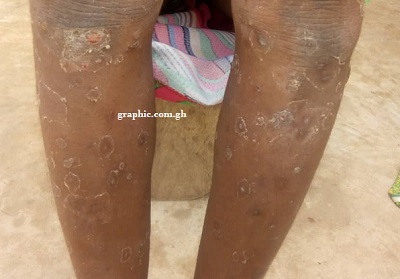
Gambaga residents undergo five-day Mass Drug Administration to control scabies
Residents of Gambaga in the East Mamprusi Municipality of the North East Region have undergone a five-day Mass Drug Administration (MDA) exercise to control the outbreak of scabies, a skin infection, in the district.
Organised by the District Health Directorate together with the Neglected Tropical Disease (NTD) unit of the Ghana Health Service (GHS) and the Kumasi Centre for Collaborative Research at the Komfo Anokye Teaching Hospital (KATH), the exercise covered the entire population, providing treatment for over 4,000 active cases as well as their contacts.
Advertisement
The district was hit by the infection, caused by a mite which burrows under the skin and lay eggs, causing rashes and intense itching, in September this year.
Read also: GHS moves to contain spread of scabies in East Mamprusi
The District Director of Health, Mr Mark Abugri, told the Daily Graphic that during the exercise, which started on Saturday, November 6, 2019, the residents were administered the medication, ivermectin, by 360 volunteers who moved from house to house.
In all, about 390,000 tablets of Ivermectin, worth US$594,000, provided by the GHS were administered to about 80 per cent of the estimated 180,000 population, Dr Abugri stated.
He indicated however that the District Health Directorate funded the treatment of the about 5,000 cases that were first reported at a cost of GHc50,000.
“In addition to the ivermectin, we also gave them pain killers and anti-histamine to reduce the intense itching,” he added.
Reinfection
Although the burden of the disease had reduced, since the outbreak, the mass drug administration had to cover the whole population due to the danger of reinfection.
Mr Abugri explained that people who come into contact with those who get the infection incubate the disease and can easily cause reinfection, hence the need to administer the medicine to the whole population.
He stressed however that some exclusion criteria were however applied during the exercise as some people are ineligible to take ivermectin for medical reasons.
“Those who are below the height of 90 centimeters, mainly children; pregnant women and those who are seriously sick cannot take the medicine, even if they have the infection,” Mr Abugri emphasised.
For those people, he said, the Kumasi Centre for Collaborative Research at the Komfo Anokye Teaching Hospital is providing another medicine, Benzyl Benzoate to be administered to them.
Public education
Furthermore, Mr Abugri said, the health directorate had embarked on public education to prevent the re-occurrence of the infection.
He noted that the disease is fueled by unsanitary conditions as the mite that causes the infection thrives in unhygienic environment, “thus personal hygiene is a critical factor to any control effort.”
Therefore, during the public education, households are advised to use soap to bath and to desist from the practice of everyone using the same sponge to bath and towel to dry themselves. They are also encouraged to bath with warm water and to soak their clothes in warm water before washing, as these measures reduce the survival of the mite.
In addition, the residents are taught to smear their bodies with pomade, particularly, shea butter to deprive the mite of air and kill them off, Mr. Abugri added.
Environmental factors
He however observed that the directorate will need the involvement of other stakeholders in the environmental aspect of the control effort as the activities fall beyond the mandate of the health sector.
“For instance, aside the public education, the residents must be supported to disinfect their clothing, beddings and rooms to avoid reinfection,” he added.




